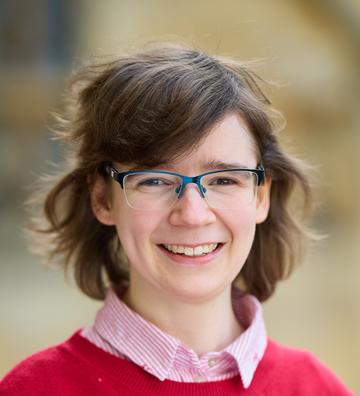Clare Rees-Zimmerman
Dr Clare Rees-Zimmerman
Postdoctoral Researcher
Aarts Group

Biography
I grew up in a village on the edge of Sheffield, enjoying both being a mile away from the Peak District border, and the opportunities of the city. I had the “problem” of being good at and loving a lot of subjects at school, so found it difficult to decide what to study at university. I enjoyed solving problems, regardless of whether they were mathematical, linguistic, or musical; at the same time, I wished to gain the skills to tackle humanity’s biggest problems. For my undergraduate degree, I therefore decided to study Chemical Engineering via Natural Sciences at Trinity College, University of Cambridge, enjoying the breadth of the degree, learning about industrial applications, and developing confidence in tackling open-ended problems.
For my final year undergraduate project, still enjoying puzzles, I chose to model the patterns formed by blood spots during drying. Not as gruesome as it sounds: the project is important for developing accurate paper diagnostics using blood spots. I really enjoyed this taste of research, in an area that will improve people’s quality of life, and so stayed on to do a PhD at the University of Cambridge.
Whilst research can be slow, my PhD made a number of exciting discoveries, including discovering a new particle motion at the nanoscale, and explaining why small particles often accumulate at the top surface of drying films. For the latter work, I was awarded the 2023 Institute of Mathematics and its Applications (IMA) Lighthill-Thwaites Prize for applied maths: it was an honour to have my work recognised as interesting applied maths in its own right, whilst my motivation for doing the work was to address a practical engineering problem. For my thesis as a whole, I won the 2023 Katharine Burr Blodgett Award for an outstanding PhD thesis in colloid and interface science.
Current research
My work is multidisciplinary, across the fields of chemistry, engineering, physics, and applied maths. My current research addresses the need to make functional materials more sustainable, by using less of the expensive components, but still delivering the required properties.
After my PhD, I moved to Oxford for a Junior Research Fellowship at Christ Church, hosted by the Oxford Colloid group: colloids are dispersions of particles in fluid, such as blood (the subject of my Masters thesis), paint (the subject of my PhD) and coffee!
With the Oxford Colloid group, I am developing and implementing a method to infer particle interactions from images, from which the particle coordinates can be extracted. This combines the fundamental science of statistical physics (using statistics to describe large assemblies of particles) with the mathematical subject of inverse methods (estimating parameters from data). In the chemical industry, particle interactions are typically approximated; our simple experimental measurement will allow for improved formulations, from personal care products to pharmaceuticals to paints.
We aim to better understand the liquid state: unlike molecular particles, particles of colloidal size are large enough to be observed by the optical microscope; however, they still undergo observable Brownian motion (random thermal motion). I am applying the method to mixtures of different particle sizes, as well as exploring whether it can shed insight on the motion of active particles, such as bacteria. In addition, I am demonstrating the advantages and limitations of our inverse method.
This project excites me because of the combination of fundamental science, applied maths, and many potential applications of being able to precisely measure particle interactions.
Other interests
I tell myself that my subconscious is working on my research problems even when I am not actively thinking about them, and often my computer code takes a long time to run, so I don’t worry about having time off from research. I spend a few hours a week teaching, which is a rewarding break – and the students always teach me things, too!
Outside of work, I enjoy music: wherever I go, I find an orchestra in which to play the violin. It is both a way to have fun with other people, and to create something excellent together – and I have been all over Europe touring with orchestras. I also try to keep fit (important for working in the lab!), including doing pilates and going swimming.
Being part of an Oxford college has been very helpful to find friends whilst I am new to Oxford, as well as providing dinner conversations with researchers across subjects. Moreover, the great quality college food ensures I go there for a proper lunch break each day.




